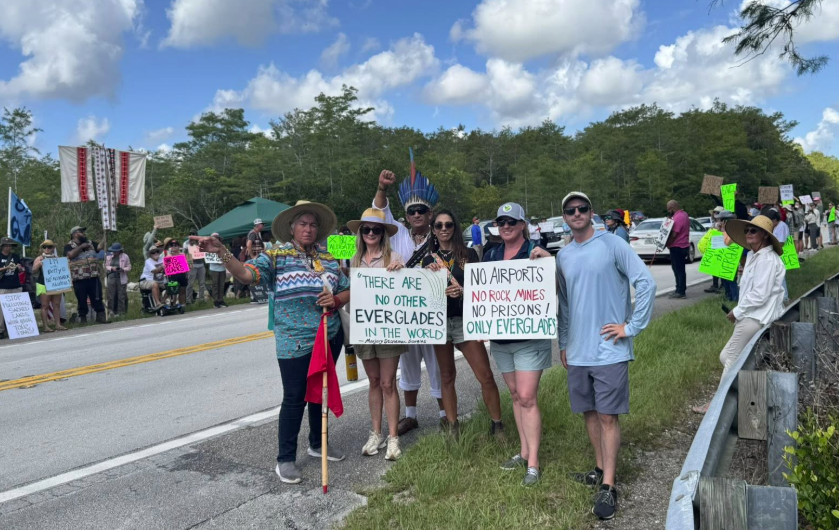
- Details
- By Levi Rickert
Breaking News. "The Miccosukee Tribe of Indians of Florida (the “Tribe”) is filing suit as an intervening plaintiff in the case brought by Friends of the Everglades, the Center for Biological Diversity, and Earthjustice against the state and federal governments over the construction of a detention center, referred to as 'Alligator Alcatraz,' in the Florida Everglades."
The lawsuit challenges the failure to conduct required environmental reviews or obtain necessary permits prior to the construction of the proposed facility. The Tribe remains firmly committed to protecting its traditional lands from being used as a detention facility.
Contrary to claims that Big Cypress is an uninhabited wilderness of alligators and pythons, it is, in fact, traditional Tribal homeland—home to fifteen active Miccosukee and Seminole villages. It borders the Miccosukee Water Conservation Area 3-A and the Miccosukee Reserved Area. One village and a school bus stop are located just 1,000 feet from the facility’s entrance, and eleven villages or ceremonial grounds lie within a three-mile radius. This landscape has provided safety and sustenance for generations of Miccosukee and Seminole people.
Over the past year, Miccosukee leadership has worked alongside conservative groups in southwest Florida, traveling to and from Washington, D.C., to advocate for public and Tribal rights to continue living, hunting, and fishing in Big Cypress.
“The Miccosukee Tribe is committed to ensuring that our ancestral lands in Big Cypress will not become a permanent detention facility. We have reached out to the State and Federal governments and expressed our concerns, but we have not yet been advised of a closure date. As a consequence, we must take legal action to compel the parties to remove this facility, given its outsized budgetary, environmental, community safety, and logistical impacts. We are hopeful that the administrations will change course and preserve these lands," Chairman Talbert Cypress of the Miccosukee Tribe of Indians of Florida said.
The facility represents a misuse of Florida’s resources. Its annual maintenance is projected to exceed $450 million, with only partial reimbursement potentially coming from FEMA—funds that are critical during hurricane season. This undermines recent efforts by the Florida Legislature to reduce wasteful spending and puts Floridians at risk. Additionally, the environmental consequences of unpermitted fill, insecticide fogging, constant light pollution, vehicle and flight traffic, and other disturbances would be severe and long-lasting.
“Across the United States, sacred sites are being threatened by development that is happening without the required consent of tribes who have called these lands home since time began," Judith LeBlanc (Caddo), executive director of the Native Organizers Alliance. "The Miccosukee Tribe has an inherent right to determine the future of their ancestral homelands. Yet they were not consulted when this huge immigrant detention center was quickly constructed."
Editor's Note: This is a developing story. Native News Online will update as more information becomes available.
More Stories Like This
Native News Weekly (August 25, 2024): D.C. BriefsNative Bidaské: The Illusion of Freedom and the Myth of America 250, Leonard Peltier Speaks Out
Monday Morning (March 2, 2026): Articles You May Have Missed This Past Weekend
Native News Weekly (March 1, 2026): D.C. Briefs
Scope Narrowed, Report Withheld: Questions Mount Over Michigan Boarding School Study
Help us defend tribal sovereignty.
At Native News Online, our mission is rooted in telling the stories that strengthen sovereignty and uplift Indigenous voices — not just at year’s end, but every single day.
Because of your generosity last year, we were able to keep our reporters on the ground in tribal communities, at national gatherings and in the halls of Congress — covering the issues that matter most to Indian Country: sovereignty, culture, education, health and economic opportunity.
That support sustained us through a tough year in 2025. Now, as we look to the year ahead, we need your help right now to ensure warrior journalism remains strong — reporting that defends tribal sovereignty, amplifies Native truth, and holds power accountable.
 The stakes couldn't be higher. Your support keeps Native voices heard, Native stories told and Native sovereignty defended.
The stakes couldn't be higher. Your support keeps Native voices heard, Native stories told and Native sovereignty defended.
Stand with Warrior Journalism today.
Levi Rickert (Potawatomi), Editor & Publisher

